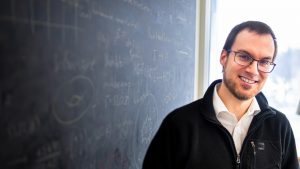The Quantum Horizons Alberta research network is set to pursue transformational research and unlock the mysteries of quantum mechanics to revolutionise our future.
Albert Einstein said that imagination was more important than knowledge. Was he imagining a world a century later, where his quantum theory of light had transformed our everyday life?
What started with Einstein questioning the very nature of how light worked led to the creation of lasers in the 1960s, which we now use for incredible purposes such as life-saving surgeries, fibre-optic communications, measuring atmospheric weather, mapping the surfaces of other planets, and more. Lasers also make mundane tasks, like scanning a barcode at the grocery store or using a TV remote, possible.
In 2023, it is the type of technology that we take for granted. But without the novel discoveries fuelled by the insatiable curiosity of quantum physicists in the early 20th century, we would still be getting off the sofa to change the channel – or more likely reading a book, because without quantum physics, we wouldn’t have television either.
In quantum research, this pipeline of foundational science to practical applications didn’t stop with the founding theorists of quantum science. Quantum technology being developed now grew out of quantum foundational studies over 25 years ago, and the foundational studies of today could lead to groundbreaking technologies in the 2050s.
Fortunately, the thrill of the unknown, unpredictable, and undiscovered drives quantum scientists, and sparks the public’s imagination. Thanks to a group of visionary donors with a passion for quantum science and the mysteries of the Universe, fundamental quantum studies have just received a C$25m boost.
Quantum Horizons Alberta (QHA) is an Alberta-wide initiative to expand foundational knowledge of quantum science and pursue transformational research into the potentials of quantum physics. QHA will grow Alberta’s considerable capacity in quantum research through a partnership with the University of Alberta, the University of Calgary and the University of Lethbridge.
Speaking on behalf of the group of donors, Richard Bird said: “Quantum science is an increasingly critical area of study around the world and we have the opportunity to establish our province as a key source of research and discoveries in a field which promises to be transformational to the human condition.”
Joining Bird as QHA donors are Joanne Cuthbertson, Patrick Daniel, Guy Turcotte, and Mac Van Wielingen, with the expectation that the group will continue to expand as supporters from across Canada join the initiative.
Funding through QHA is intended to build quantum science capacity in Alberta by supporting existing expertise and attracting new talent as part of a focused strategy. QHA will create nodes of expertise, made up of faculty and researchers who will advance selected areas within foundational quantum science. The goal of the initial QHA investment is to recruit a minimum of eight new quantum research professors to Alberta over the next two years, along with funding for many postdoctoral scholars and graduate students to pursue transformative quantum discoveries from within these nodes.
Investment in curiosity-driven research is critical to quantum innovation
QHA donors and supporting researchers agree that curiosity-driven research is worth their time and resources, despite the current media focus on applied quantum technology, like quantum computers or unbreakable cryptography.
Dr Joseph Maciejko, PhD, Associate Professor in the Faculty of Science and interim QHA lead at the University of Alberta, said: “If you want to answer a very practical problem – which we often need to do – you will typically get some kind of incremental advance.

© Johan Ulan
“But if you want something that’s completely different, you need to allow yourself to come up with outrageous ideas and not dismiss them outright but take the time to investigate them. It can be high-risk, high-reward research.”
These qualities of foundational quantum research align with the unique strengths QHA donor Joanne Cuthbertson sees in the province.
Cuthbertson said: “I think we have eyes for opportunities here. We have experience with starting something small and building up to something large, and we have a lot of respect for the relationship between making an investment and reaping a reward.
“And very notably, we have a tolerance for risk-taking.”
Dr Maciejko added: “Foundational quantum science is reaching a critical point where investment is necessary.”
Some of the technology that we use every day, such as smartphones, will soon be limited by our understanding of quantum. Computer chip manufacturers are facing limitations, and the consumer demand for smaller, faster, more powerful smartphones is only increasing.
“We understand a lot of quantum mechanics at the level of silicon – the key element used to make computer chips.
“We understand how quantum fits in that, and physicists can design chips and engineers can make them. But now we’re making chips so small that our understanding of quantum mechanics won’t apply for much longer, and the engineering textbooks could become obsolete in ten years.
“If we stop funding and supporting fundamental science, we’re going to keep going for a while, but eventually we’re going to run out of ideas and inspiration. To have these big transformational leaps, you need to keep supporting the science,” continued Dr Maciejko.
QHA donor Patrick Daniel is a strong believer in research for the sake of expanding human knowledge. He said: “There’s a lot of research that goes on in Alberta focused on commercial outcomes, and QHA is an opportunity to break out of that mould.
“We understand so little about the Universe. We want to appeal to individuals’ interest in things that are totally unknown and help put Alberta on the world stage for quantum science.”
The mind-bending conundrum of gravity, relativity, and quantum
So what foundational questions are on the minds of quantum scientists today? To answer this, we move into the parts of quantum that are far more esoteric and mind-bending than a smartphone, such as gravity, the Big Bang, black holes and beyond.
Dr Barry Sanders, PhD, Professor in the Department of Physics and Astronomy at the University of Calgary and Scientific Director of Quantum City, said: “The most foundational issue for us is that we have a beautiful theory of gravity that emerged from Einstein’s work over 100 years ago, and we have quantum theory, and they don’t fit together.”

© Riley Brandt, University of Calgary
The concept of gravity can be explained using the theory of general relativity, which is a classical physics theory, like those needed to explain colliding billiard balls or the Moon’s orbit of Earth. Quantum physics is less familiar and less easily observed in the world around us because its foundational duality of waves and particles creates phenomena inconsistent with our classical physics understanding of how objects and systems behave.
Despite that, quantum accurately predicts the behaviour of many objects and systems, such as atomic particles and light. The theories of relativity and quantum are both powerful tools, but the challenge faced by physicists is that they are fundamentally inconsistent with each other and cannot be brought together or ‘unified’. The key to this unification has eluded physicists for many decades and will transform the field when discovered.
“This comes up if we start asking big questions about the Big Bang and the origin of the Universe, and the formation of black holes,” said Dr Sanders.
Gravitational singularities, states where gravity is so strong that spacetime collapses on itself, are believed by some scientists to be a critical component of both the Big Bang and the formation of black holes. But their existence and behaviour cannot currently be explained by classical or quantum physics.
Dr Sanders continued: “Those questions might not seem important, but the key point is we rely on both the theory of gravitation and quantum theory every day. The fact that we’re not able to reconcile the two theories is terrible.”
There are many theories out there about how the issue of gravity and quantum can be reconciled, but, regardless of which theory is proven, it will be a massive leap forward in our understanding of the Universe.
Citing historian and philosopher Thomas Kuhn’s concepts of paradigm shifts in science, Dr Sanders explained: “There’s normal science and there’s revolutionary science. Revolutionary science occurs when we have to develop an entirely new paradigm.
“We’re at that now – the normal science has not been working for decades, and we’re hoping this revolution comes along where we’re able to solve these really intractable problems.”
The foundational questions of quantum computing
This boundless sense of possibility is what keeps Dr Sanders excited about his research. He describes it as ‘a foray into the unknown,’ and ‘like exploring a new world’. Dr Sanders’ current focus is the foundational challenges of quantum computing.
He said: “We have two problems with quantum computers.
“The first problem is we don’t know yet how to build a quantum computer that is useful and scalable. The second problem is even harder, it’s what to do with it when we build it. Even though there’s a lot of discussion that quantum computers would change everything, we really don’t know that yet.”
Dr Sanders is a theorist, so instead of attempting to build a scalable quantum computer, he and his students are working to overcome barriers to quantum computer performance using quantum logic – information processing that follows the laws of quantum mechanics.
He explained: “A lot of literature might say that quantum computers are going to make computers faster. That’s not what we do.
“What we want to do is to find problems that will be forever hard with classical approaches and then figure out a way to make them easy.”
Finding inspiration in the puzzle-like qualities of quantum materials
‘Easy’ isn’t a word that the public typically associate with quantum science. Researchers know how difficult it can be to gain support for foundational quantum science when the public perceives it to be too complex for a non-scientist to understand.
Dr Maciejko believes that quantum can feel more welcoming to the public if it’s framed differently.
He said: “We have to overcome this barrier that if it’s complicated, it’s perceived as scary.
“People say, ‘it’s too complicated, I don’t have the skills’, but if there’s a way to perceive it as a puzzle that is a fun thing to engage with, I think that can help.”
Quantum’s puzzle-like qualities are at the heart of Dr Maciejko’s quantum materials research. He is working to understand how quantum physics manifests on a macroscopic scale, in the properties of a material.
“You start with a set of basic rules that are always the same. It’s like Lego bricks – they snap in a certain way and not another way. It’s very simple to understand, but how is it that from that comes this immense variety of structures and phenomena?” Dr Maciejko asked.
One of the key discoveries in quantum materials research was how magnets work on an atomic level. This emerged in the 1920s, when ‘electron spin’ was first described as one of the four quantum properties of an atom. Our understanding of magnets eventually led to the creation of Magnetic Resonance Imaging (MRI) machines. This is an example of a practical application of the research, but it is the core questions of quantum materials that keep Dr Maciejko inspired.
Citing instances of the theory we see in nature, like the fractals that lead to the patterns of ferns, or patterns in the sand on the floor of the ocean, he asked: “How does complexity emerge from simplicity?
“It’s exciting and beautiful.”
QHA donor Guy Turcotte shares this optimism for the unknown. He said: “We may not know where the discoveries are going to come from, but we do know it’s going to be exciting when we discover new solutions to the world’s unanswered curiosities.”
Alberta’s robust quantum ecosystem is primed for discovery and innovation
Dr Sanders and Dr Maciejko believe that QHA is a tremendous opportunity for a groundbreaking, ‘eureka!’-type discovery to happen in Alberta.
“Quantum Horizons Alberta is the kind of thing we need,” Dr Sanders added.
“We don’t know when the revolution will take place. We don’t know how it will happen, but we need people to come in with creative thinking, because we don’t know which stone to turn over to find the next answer.”
But QHA donors and Alberta’s quantum researchers aren’t looking to pit foundational science and applied technology against one another — it’s quite the opposite. They view QHA as an investment in Alberta’s future that will enable a long-term and sustainable path for Alberta’s leadership. One with impact that will reach far beyond the province.
Leaders in Alberta’s quantum ecosystem have collaborated closely to expand research and innovation activities — from fundamental science to applied technology — with economic impact.
At the heart of the ecosystem is the collaboration between researchers across the spectrum of quantum science and between universities. Key to this collaboration is Quantum Alberta, the provincial network of academic and industry experts working to elevate quantum research, development, and commercialisation in the province.
Alberta universities are investing in training the next generation of quantum scientists and working professionals. Programs include the University of Calgary’s new Masters in Quantum Computing, and the Quanta program based at the University of Alberta. This program trains graduate students in emerging quantum technologies while developing innovation, management, and entrepreneurial skills.
State-of-the-art facilities like the nanoFAB Characterization Facility at the University of Alberta and the in-development qLab at the University of Calgary support R&D activities for academic and industrial users, increasing the province’s capacity for technology transfer and commercialisation.
Alberta is also home to Quantum City – a quantum innovation hub dedicated to growing the quantum technology sector in the province through industry partnerships and knowledge transfer activities. Quantum City is focused on transferring ideas and research results to enable innovative new products and services to be developed. A key component will be the soon-to-be-launched qHub program, designed to support quantum creator and quantum user companies, from start-up to small and medium-sized enterprise (SME) and beyond.
The components of this continuum — foundational science, discovery, knowledge translation, commercialisation, and economic impact — are linked, influencing one another as they grow and thrive.
“Our ecosystem having the best and the brightest considering the deepest questions for the longest term creates a brain trust, and it does matter to potential investors,” added Dr Sanders.
There’s a quantum principle called ‘superposition’. It states that a quantum system can exist in multiple states at the same time, unlike in classical physics, where systems are either one state or another.
QHA is a key part of Alberta establishing its own ‘superposition’ in quantum science, so to speak – multiple areas of strength, allied and shaping one another.
“Without investment in the foundational work, we wouldn’t be able to make a world-class viable ecosystem that translates knowledge from quantum into technology.
“It’s an essential part of success,” Dr Sanders concluded.
Please note, this article will also appear in the fifteenth edition of our quarterly publication.









